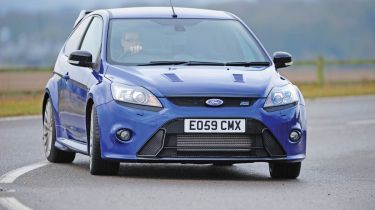Which has the best handling?
Involving driving experiences define our foursome
These cars are all about driving thrills. And while the brochure says the Scirocco R has 55bhp more than the regular 2.0-litre, the question is whether its handling is sharper, too?
The newcomer rides 10mm lower, and its steering feels more weighty. But the changes haven’t increased the communication you get through the steering wheel – if anything, it’s more numb.
Grip is superb, as is body control. Yet you’re left detached from the action. The electronic differential means traction is better than in the Focus, but not as strong as the Renault.
The Scirocco’s stability system is good, and the brilliant Adaptive Chassis Control (ACC) dampers are standard. They offer comfort, normal and sport settings – but no matter what mode we chose, our car’s optional 19-inch wheels affected the ride around town.
Arguably the biggest problem with the R, though, is the fact it’s not much more involving to drive than the capable standard coupé.
Lighter
The Audi isn’t as focused as the VW. Corner hard, and there’s extra give in the suspension, plus the steering is lighter than the Scirocco’s. But if anything, the driver gets more sense of what’s going on in the S3 than the R.
Used - available now

2018 Mercedes
C-Class Saloon
56,000 milesAutomaticDiesel1.6L
Cash £13,475
2020 Land Rover
Range Rover Evoque
31,828 milesAutomaticDiesel2.0L
Cash £21,450
2023 Land Rover
Range Rover Evoque
19,302 milesAutomaticPetrol2.0L
Cash £23,750
2022 Volkswagen
T-Roc
43,345 milesAutomaticPetrol1.5L
Cash £17,200As the only 4WD model, the Audi predictably provides the best traction. It’s easy to drive quickly and reassuring in the wet. The S3 can’t match its rivals’ accuracy and potency, but is still likeable.
In contrast, the Focus always feels hardcore. Through corners, you’re constantly reminded of the five-cylinder engine’s weight, and its huge power output means traction is an issue. This is a pity as the steering is precise and well weighted, and the communicative chassis very accomplished.
But for all its talent and power, the RS still lacks the responses and agility of the best-handling car in our line-up: the Mégane.
The French model is the lightest, most agile choice. It responds to driver inputs with an immediacy missing from its rivals, and the steering provides great feedback. Traction is the best of all the front-wheel-drive cars and body control is faultless.
On the road, the chassis feels as stiff and composed as the VW’s, but the Renault is grippier and more involving. While the ride is unforgiving on bumpy roads, non-Cup models promise to be more civilised. They have smaller anti-roll bars and softer springs, yet miss out on our car’s clever mechanical limited-slip diff.
Renault: 5/5
Agile, beautifully balanced 250 gives a hot hatch masterclass. Cup chassis has stiffer springs, dampers and anti-roll bars than the standard 250, as well as a limited-slip differential. Just be prepared for the firm ride.
Volkswagen: 4/5
The Scirocco R is a very capable machine that mixes excellent body control with strong grip and powerful brakes. But it isn’t much more involving to drive than the accomplished standard TSI version.
Ford: 3/5
While the chassis offers lots of grip and plenty of feedback, the weight of the Focus’s engine affects the handling. Traction breaks easily and torque steer can corrupt the steering. It’s not as agile as the Renault, either.
Audi: 3/5
The S3 is the softest car in this test, but still has lots to offer. It’s reassuring in poor weather due to the 4WD, and the light controls give decent feedback. Yet the ride is firm without the optional adaptive dampers.



